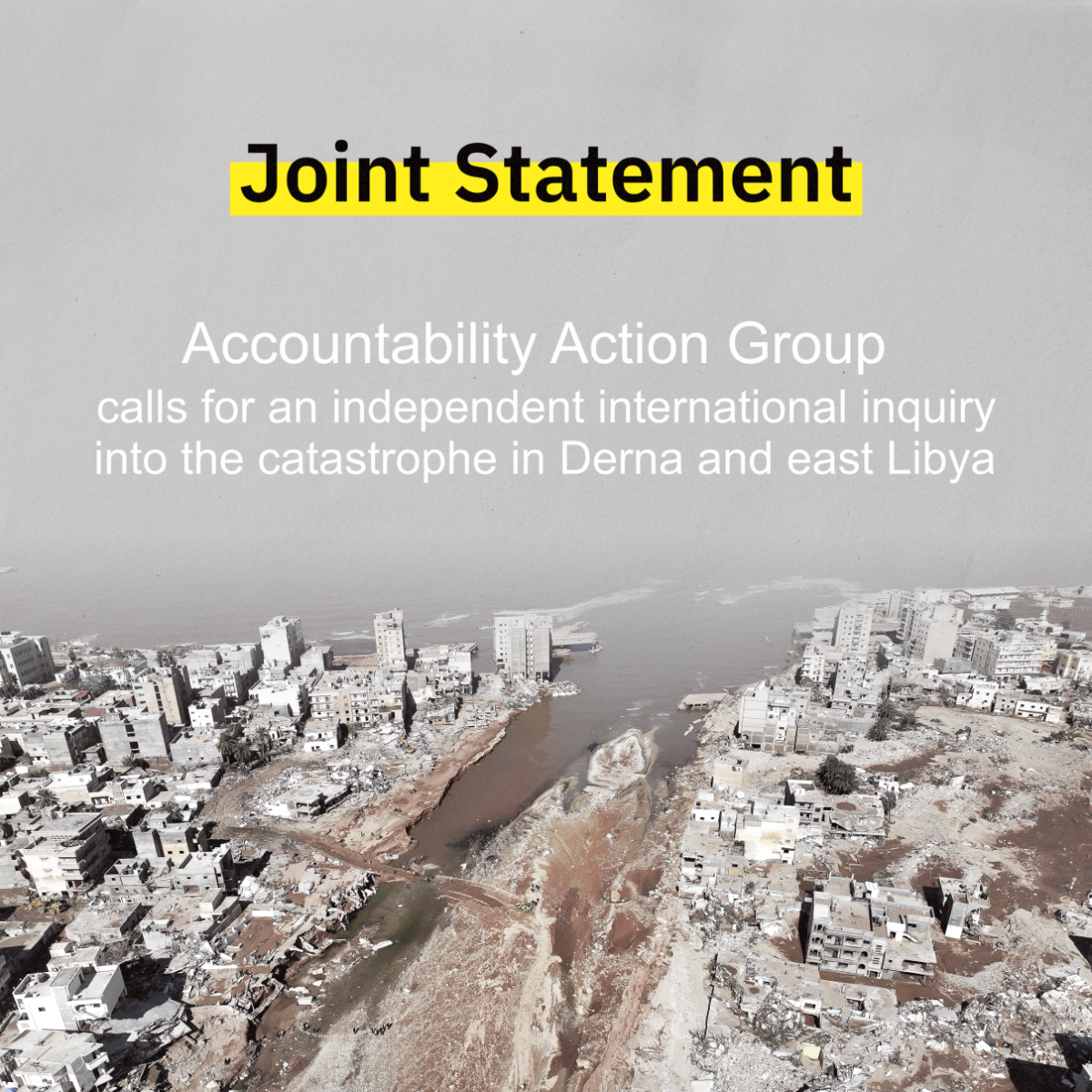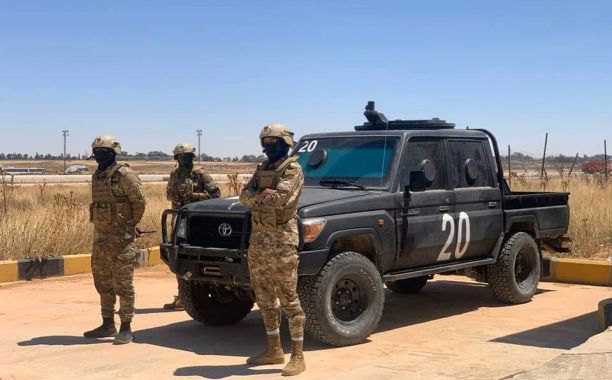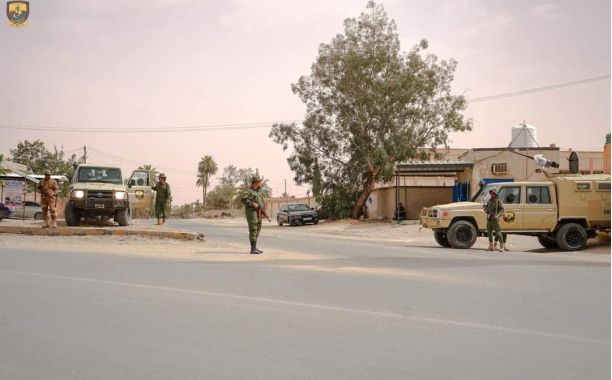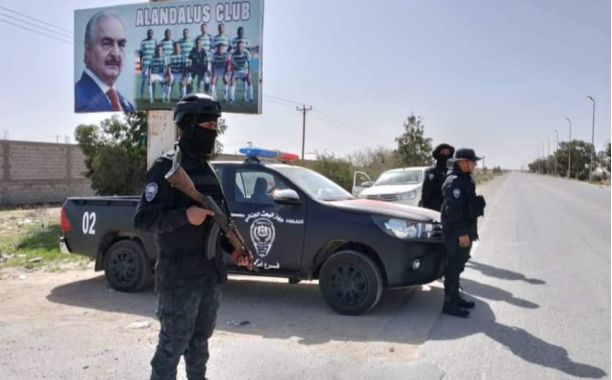
The Defender Center for Human Rights, Libya Crimes Watch (LCW), Tahra organisation and Lawyers for Justice in Libya (LFJL) echo the demands of residents of Derna for an impartial, fair and independent investigation into the disastrous collapse of two dams upstream of Derna, which led to the death of thousands of people. The group calls for the establishment of an independent international mechanism to investigate the state’s responsibility for the disaster and to establish the individual responsibility of the officials responsible for the dams’ collapse to bring them to justice and provide reparations to the victims.
To that effect, the aforementioned organisations announce the launch of a Libyan-led initiative titled the “Accountability Action Group” to advocate for the demands of Derna residents and other affected communities in eastern Libya.
Our call comes as a result of hundreds of Derna residents demonstrating in front of the Al-Sahaba Mosque on 18 September, urging Libya’s chief prosecutor to speed up the release of findings from investigations into those responsible for and implicated in the aggravation of the disaster, whether through negligence or corruption. While protesters demanded that Derna’s reconstruction take place under international supervision, they also called for an international investigation into the circumstances that led to the collapse of the two dams and the resulting disaster. The calls from the protestors triggered the authorities to respond with a repressive campaign of arrests that targeted demonstrators and journalists.
Background
On 11 September, Storm Daniel pounded several cities in eastern Libya, including Derna, where flooding was compounded by the collapse of two dams in the city. This left thousands of people deceased and wiped away entire neighbourhoods.
There are major disparities in statistics on the number of victims. The eastern Libyan authorities’ Ministry of Health said that the death toll had reached 3,868. However, the United Nations Office for the Coordination of Humanitarian Affairs (UNOCHA) said some 11,300 had been killed, in addition to more than 10,000 missing.
On 14 September, a group of Libyan citizens, civil society groups, human rights defenders and journalists launched a petition calling on the international community to, “establish an international independent investigation committee … to uncover the causes of this catastrophe, identify those responsible for it and hold them to account.”
The aforementioned organisations support this demand, as a way to hold accountable those responsible for the aggravation of the disaster, to put in place the necessary guarantees that would prevent it from recurring, and to provide reparations to the victims. These demands come amidst attempts by Libyan officials to dismiss the catastrophe as a result of climate changes and avoid responsibility for exacerbating the impact of the floods.
For decades, gross negligence and corruption have prevented successive Libyan authorities from carrying out vital maintenance work on the two dams, despite funds being allocated for this work in the 2010, 2012 and 2021 state budgets.
Moreover, in the context of Storm Daniel, authorities failed to take the necessary measures to protect residents and evacuate them ahead of time from areas threatened by flooding. The head of the World Meteorological Organization has stated that mass casualties could have been avoided in Derna, and that the authorities’ failure to take the necessary measures, such as issuing advance warnings and using crisis management teams to coordinate efforts to evacuate the population, exacerbated the humanitarian disaster.
The UNOCHA’s spokesperson also added that Libyan authorities refused entry to a UN team attempted to visit Derna to join relief efforts.
In a delayed response to the disaster, and following protests in Derna, eastern Libyan authorities dismissed the entire municipal council and referred its members for investigations. However, the authorities started a wave of arrests against protestors and journalists submitting them for questionings and holding them under conditions that may amount to enforced disappearances for merely demanding accountability or covering the protests. There have also been multiple reports of local journalists receiving warnings to refrain from covering protests while the authorities ordered both local and foreign journalists to leave the city, claiming that they were hindering rescue operations.
Derna also suffered an internet and telecoms blackout following the protests, which the authorities blamed on severed communications cables. Online groups loyal to the authorities in eastern Libya waged a social media campaign targeting and inciting against activists and human rights defenders including women human rights defenders, to silence them.
Our call for accountability
The newly established ‘Accountability Action Group’ serves as an open channel with the public to gather information and suggestions, and bring the voices and demands of survivors and affected communities to the Libyan and international community. It will also press for the creation of an international mechanism to investigate the truth and provide reparations to the victims.
The Group can be reached at this email: LibyaAAG@gmail.com or through this Facebook page.
The group will conduct research to determine the most appropriate form, mandate and objectives of the investigative body, based on the demands of survivors and affected communities.
It will work with Libyan and international organisations and experts on corruption, climate change, crisis management and human rights, to communicate demands from affected communities to the international community for an investigation into the Libyan authorities’ corruption, neglect and abuses which have contributed to the aggravation of this disaster. Together, we will work to identify those responsible and seek reparation for victims and other affected people.



